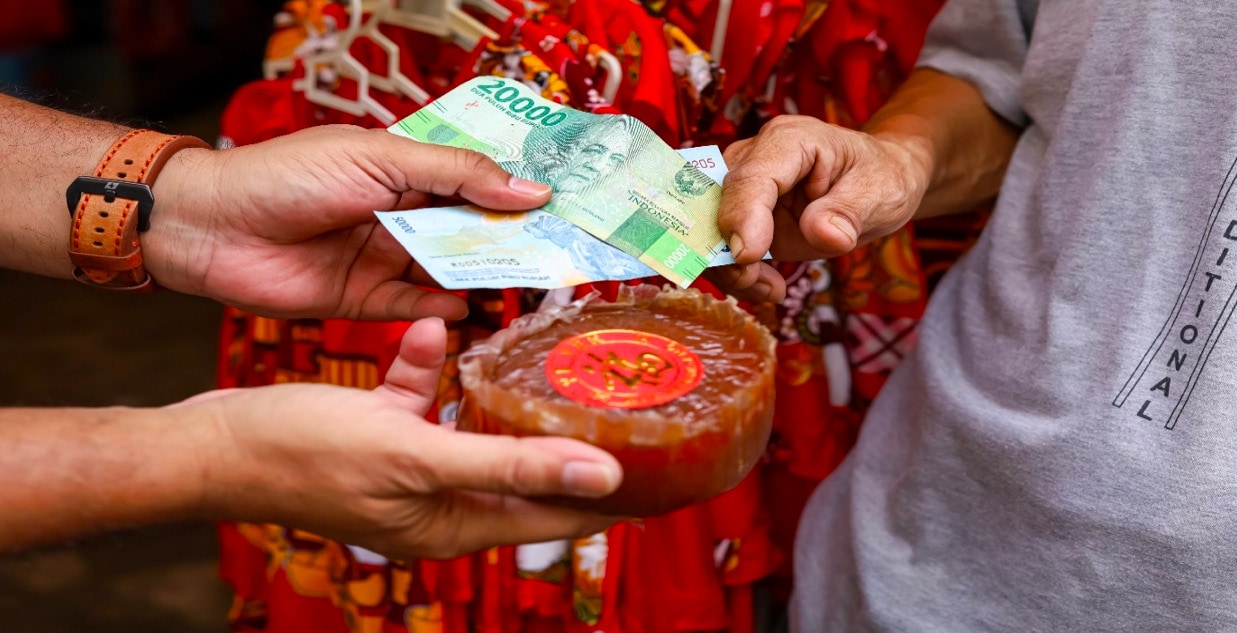
A man pay a vendor with rupiah and seller hand holding ‘Kue Keranjang’ in Glodok, Jakarta, 2023. © Indonesia / Shutterstock
آخر تحديث في: 05-07-2023 الساعة 11 صباحاً بتوقيت عدن
Moreover, the 40 families that dominate the economy in Southeast Asia are primarily of Chinese origin abroad their control covers vital economic sectors which constitute the information black hole of decision strategy in Southeast Asia.
Mehdhar Alawi (South24)
On the first day of the Lunar Calendar, a vast areas are comprised of red decorations in Southeast Asia yearly to celebrate the Chinese New Year, which is delightful. On other hand, it is a reality of the People's Republic of China (PRC's) soft power. An exploration of Deng's strategy to opening up China's economy points that, targeting overseas Chinese capital in Southeast Asia was as one of the main factors in his program. This political paper is presented the statistics and attitudes that lead to realizing the geo-economic power of the Chinese in Southeast Asia and its role in the rise of the China economy.
The Issue:
What is this about?
- The prevailing assumption is that the leaders of the Chinese Communist Party (CCP) decided to right the wrongs of the Cultural Revolution and move from focusing on ideological purity to achieving material prosperity. In 1978, Deng Xiaoping, Charman of the Chinese People's Political Consultative Conference (CPPCC), launched at the Third Plenary Session of the 11th Central Committee a comprehensive program to reform China's economy, "Reforms and Opening-up".
What is matters?
- China has become the second-largest economy in the world and a major geopolitical influencer in the world order. However, uncertainty about the development of that influence in the coming decades still slows down the measures to deal with this rise, which requires a review of ‘’China's’’ policy subtleties in the past decades by realizing aspects that contributed to the creation of this boarding. In addition, exploration the extent of the impact of Deng's program on the world order today: was China's opening-up program a temporary absence of ideology on the way to achieve a bigger future gains.
What does this call to?
- An opportunity to realization of the governments role to escalating the citizens foreign investment and benefiting strategically, recalling the crucial contribution made by Hadhrami entrepreneurs previously to economic growth in Southeast Asia and the spread of capitalism in the Indian Ocean, while its decline during the past three decades of the Yemen unity project. Where Hadhramaut (southern Arabia) formed a site to begine the cooperation relations with Europeans in the eighteenth century, according to the coverage of the British prof William Clarence-Smith.
Two decades between Ma Ying-jeou’s practices, which were described as exaggerated neutrality, and his leadership of the fastest progress in relations between Taiwan and the PRC breaks many decades of icy relations between the two governments, during the first three months of his presidency of Taiwan in 2008. [1] This was an illustration of the level of political and economic change that a political figure could have make upon assuming power.
Diplomacy has relied to a large extent on the skill of media institutions and investigative researchers in its ability to achieve the maximum benefit from the distinctive factors of making a political card that enables the state to play an essential strategic role in the international arena. Since then, many consider those institutions are the primary contributor to the global peace industry based on their ability to create valuable opportunities in negotiation and diplomatic barter.
It becomes crucial to explore that strategy to enhance the diplomatic approach in the competition between the powers and the realization of interests away from military options.
The prominent political strategies in the international arena often occupy the attention of analysts and researchers in two situations. One, is in terms of the expected results that may raise concerns for international peace and security. Two, is the urgent necessity that these moves create to draw or update a counter strategy. For instance, when a concern arises from the transformation of a human economic behavior into a hostile political performance.
Replace Partisan Diplomacy
It seems that China is distinguished, among others, in devising its diplomatic strategies and flexibly moving where time is a factor. Similar to modern Debt-trap diplomacy, there was partisan diplomacy as well, which was practiced for many years prior to moving on the geo-economic diplomacy.
The geo-economic factor was one of the advantages that the Chinese politician "Deng Xiaoping" used after he realized that China's partisan diplomacy towards Southeast Asia countries would not saturate China's appetite for openness, particularly with countries that are ideologically different. Moreover, translating the consensus reached during a Party diplomacy into action is often challenging. [2]
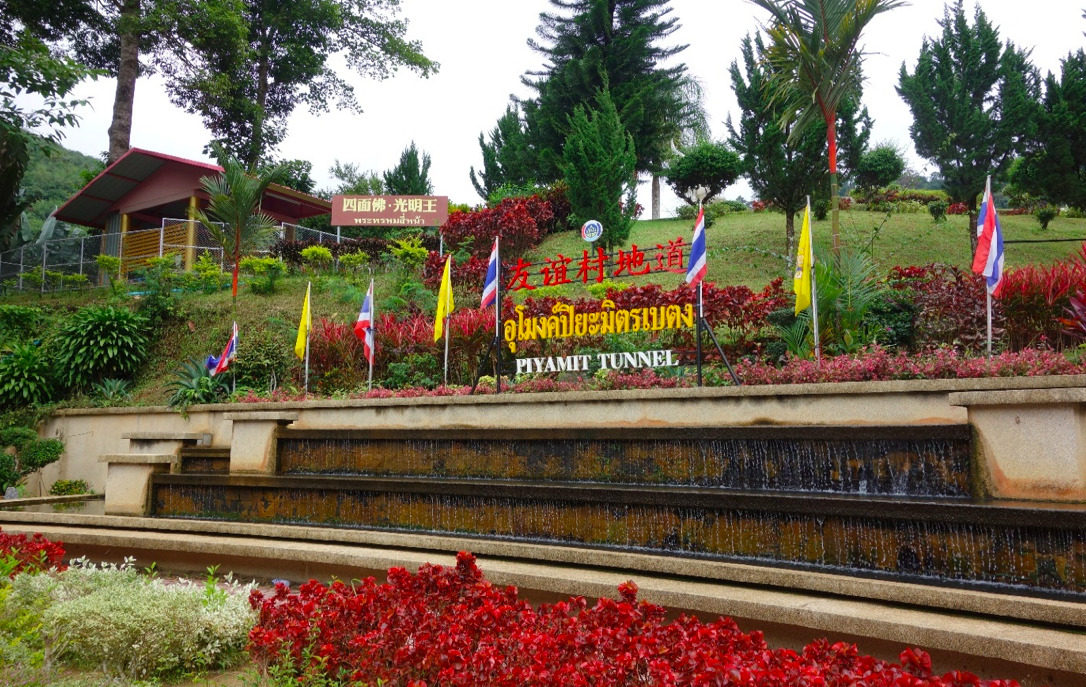
Piyamit Tunnel in Betong, Thailand, 2016. © Yun Huang Yong / Flickr
Since that realization, it became essential to find a more comprehensive and effective diplomatic strategy as a geo-economic strategy in which China maintains its soft grip in Southeast Asia, relying mainly on the Overseas Chinese capital. Where ASEAN countries are home to the world's most concentrated Overseas Chinese; more than 73% of Overseas Chinese are in ASEAN countries, at the beginning of the 21st century their number in Southeast Asia arrived at 25.26 million. [3]
Geo-Economic Diplomacy
Cutting off funding to Chinese parties abroad was the first practical step of Deng's strategy that reassured governments in Southeast Asia; this step was the impetus for the development of economic relations between China and Southeast Asia. It was also an - influential factor - that made the Chinese abroad look to their home country as an emerging economic power that is easy for them to climb with.
The investments of Overseas Chinese in Southeast Asia into the Chinese mainland
As a result, since the late eighties, the investments of Overseas Chinese in Southeast Asia into the Chinese mainland have accelerated to the point where their financial size exceeds billions of dollars today. This development relied on two main characteristics: the first being "links" or "human networks" (in Chinese, "Guanxi"), including that is regional and family ties, second gaining the trust of the Chinese government by using different human networks such as families and place of birth. Chart 1 shows the Major Foreign Investment in China by Overseas Chinese companies based in Southeast Asia.
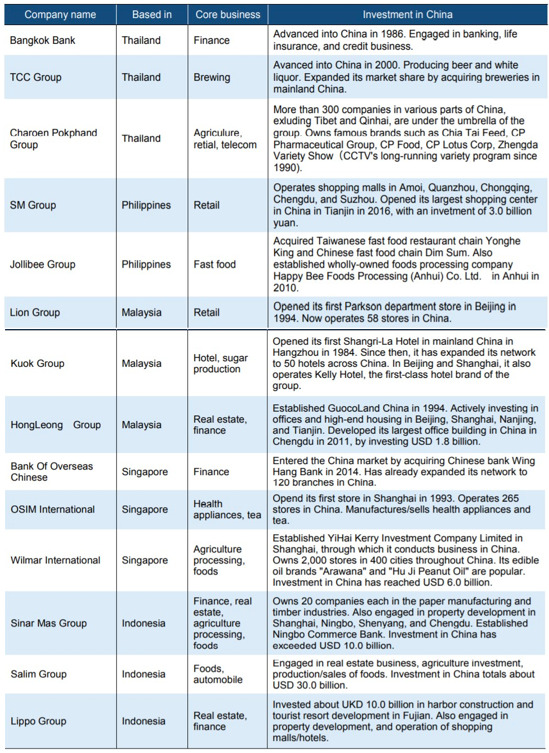
Chart 1. Foreign Investment in China by Overseas Chinese Companies Based in Southeast Asia. Source: Prepared by MGSSI based on various media reports and "Development of Overseas Chinese Entrepreneurs 2017".
In turn, this relationship effect in the growth difference in China's foreign investment between 2014-2015, which became higher by 87%, as the value of China's foreign investment flowing to Southeast Asia in 2015 amounted to about 146.04 billion US dollars. [4]
“The RM10 billion acquisition of Edra Global Energy Bhd by China General Nuclear Power Corp has caused concerns that China is meddling in our domestic politics,” says Lau Zheng Zhou, research and business development director at the Centre for Public Policy Studies (CPPS), which was established by the Asian Strategy & Leadership Institute. [5]
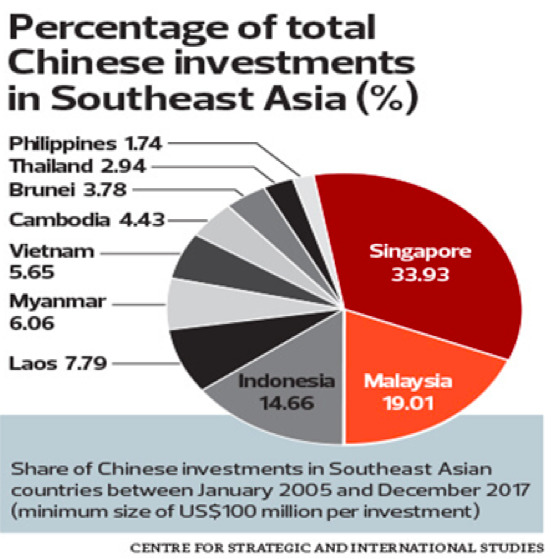
Chart 2 shows the percentage of total Chinese investments in Southeast Asia (2005- 2017).
Systematic investigations into the influence of Chinese networks abroad
On attracting China's foreign direct investment, the systematic investigations indicate - a positive and significant - relationship between the number of Overseas Chinese in Southeast Asia and the overseas investment of China companies. This relationship implicitly suggests that offshore social networks can positively promote overseas investment for domestic Chinese enterprises. Since 2001, "5,492" enterprises from mainland China have invested in 10 Southeast Asian countries. [6]
Chinese society is different from European and American societies; it is a typical "relational" society. Therefore, large Chinese networks help China investments to reduce research costs and transaction uncertainty risks. In addition, areas where the ideal legal environment is weak, save many contract execution costs, which contributes to improving the efficiency of business operations, so these social networks become factors affecting the investment decisions of enterprises.
Location Feature
In 1980, two years after ''Deng'' took office as chairman of (CPPCC), the central Chinese government established four special economic zones, including "Shantou," the birthplace of the Chaozhou people, many of whom lived in Southeast Asia, and "Xiamen" which located southeast of Fujian Province, and most of its residents are merchants in Southeast Asia. [7] "Deng" at that time openly said that the purpose of establishing Xiamen as a special economic zone was to target the overseas capital of Fujian. [8]
In confirmation of the success and continuity of this policy, in 1979-1987, 39.1% of the total US$5.22b of Overseas Chinese capital in China invested in these four Special Economic Zones and most of them from Hong Kong and Southeast Asia. [9]
As the former Chinese President "Hu Jintao" in the year 2006, more than three decades later, openly declared that There are several ten millions overseas compatriots distributing in different regions in the world and about 30 millions of their relatives in China, and all of them are the important strength for China’s modernization, nation-united and the revival of Chinese people. The (CCP) has always paid high attention to the work on them. [10]
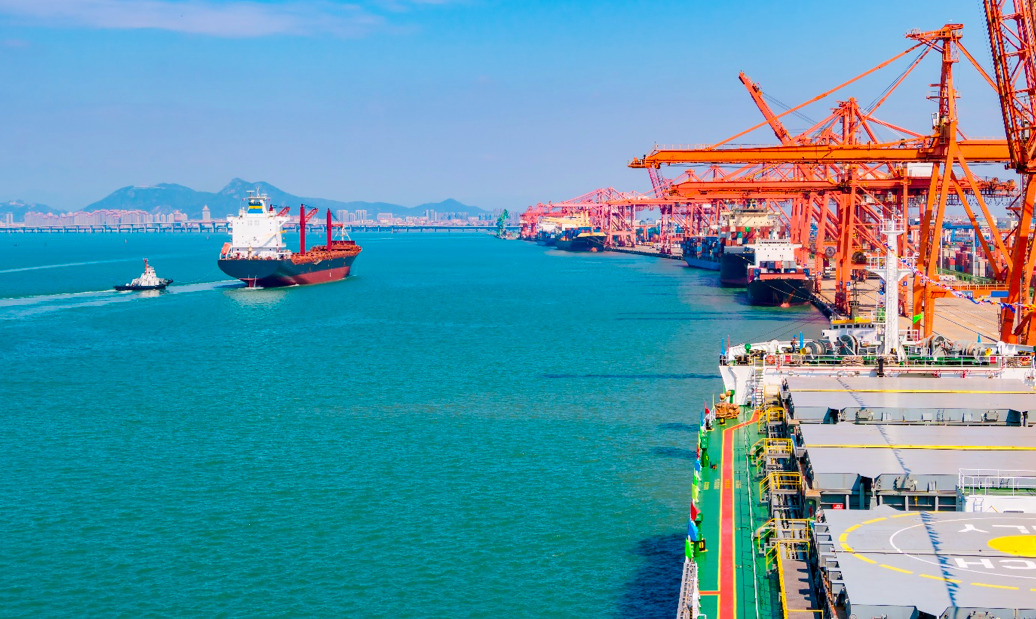
Container logistics transportation in Xiamen port, Fujian. © China / Shutterstock
Geo-cultural cofactor
The close ethnic relationship, similar customs, and practices between the Overseas Chinese and the rest of the Southeast Asia peoples also constituted a geo-cultural strategic factor for China's relationship with Southeast Asia countries, which led to a vital role in the geo-economic cooperation between China and Southeast Asia countries, it has become the Overseas Chinese in Southeast Asia controlling 70 percent of the region's corporate wealth.
86% of billionaires in Southeast Asia are of Chinese descent
Moreover, the 40 families that dominate the economy in Southeast Asia are primarily of Chinese origin abroad their control covers vital economic sectors such as telecommunications, real estate, transportation, technology, and agriculture, which constitute the information black hole of decision strategy in Southeast Asia. [11]
In this part, it is essential to note what "Lee Kuan Yew", founder and former Prime Minister of Singapore, said, "we are of Chinese origin and share the basis of culture and language; it facilitates harmony and trust. It is the basis for all business relations." [12]
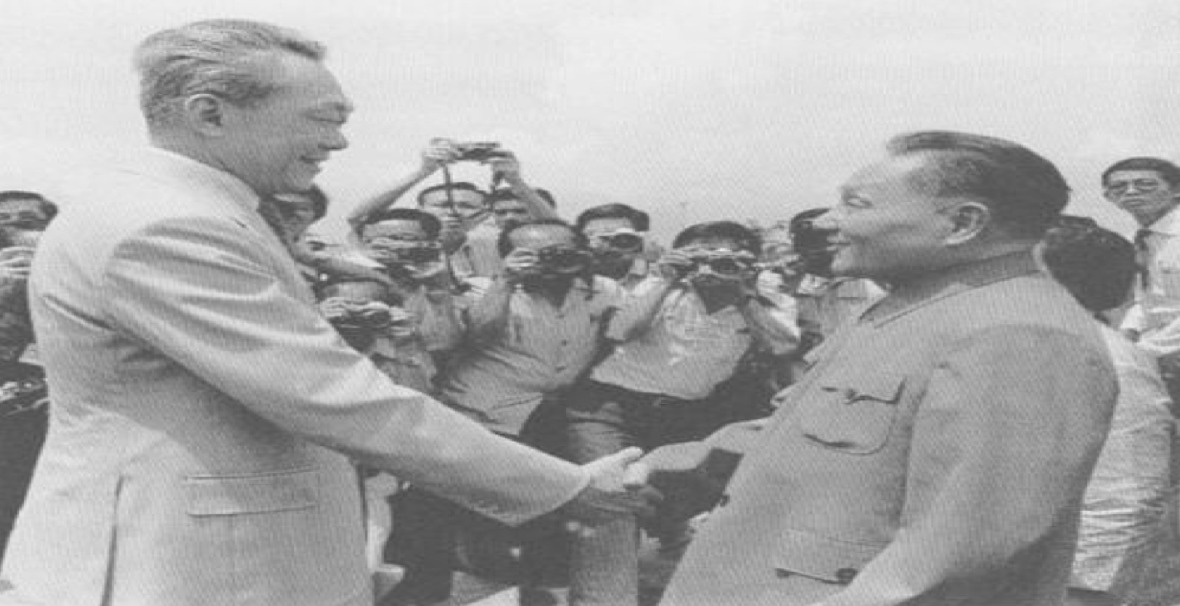
Deng Xiaoping shaking hands with Prime Minister Lee Kuan Yew at the airport during his visit to Singapore, November 1978 © Ministry of Foreign Affairs of PRC.
Acts of the governments in Southeast Asia
Recently, acts of the governments in Southeast Asia that deal locally by neutralizing their citizens of Chinese origin from assuming high positions in the state, [13] or encouraging other communities to get involved in its societies to create a cultural balance, were interpreted as reactions to concerns from China's policies. Realists look, at this as contradicting the democratic system in the state.
China's policy has caused the emergence of such practices, which governments in Southeast Asia think to ease the Chinese grip on its national economies. From the same perspective, they tended to reconsider the numbers of Overseas Chinese and the ability of their economic and political power that is not commensurate with their numbers.
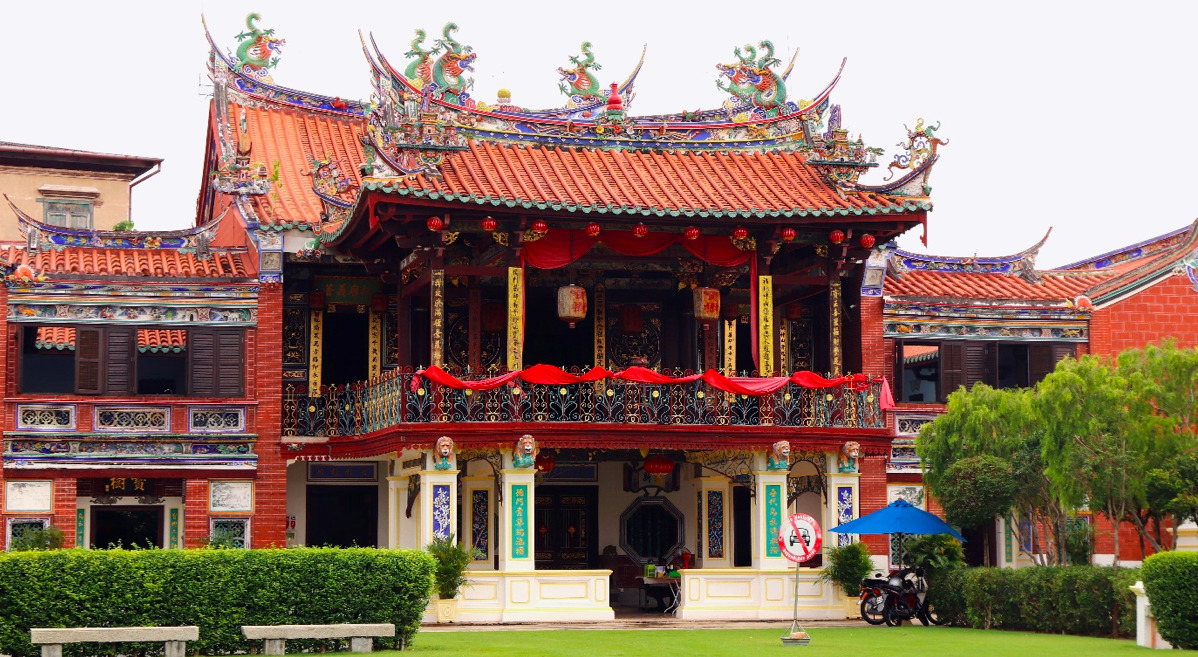
Cheah kongs one of the oldest Hokkien clan associations in George Town, Malaysia, 2022. © Ansel Adams / Flickr
China’s Tactic
If there is one thing in particular that can be asserted in consensus about the distinction of China's foreign policy, it is the skill of long-term strategic tactics. Beijing's policy known as pent-up calm to-armed rivalry - was also present in the analysis of Deng's strategy.
Prior to 1954, communist China had persistently sought to protect the interests of the Chinese abroad as well, to win their loyalty and to benefit financially, politically, and strategically from their patriotism.
Later then, replaced partisan interests with economic ambition, on other hand, China did not abandon, among other things, ideology as a foundation, as the truly historic document indicated, which was transferred to Moscow by a Chinese communist leader in March 1953, it was quite plain in its declaration of Communist intentions for Southeast Asia by using tactics including economic cooperation, alliance, united fronts, and coalitions as means of progressive and continuous pressure. Obtained by the US and published in the Congressional Record for June 1954. [14]
Besides, paying attention to what "Robert C. O'Brien," the former US National Security Adviser, wrote to Foreign Policy last September about understanding China's politics by saying that "What could be called the Davos view that China is “communist in name only” is fading. In its place, an understanding of the strength of both ethnonationalist and Marxist-Leninist conviction among the Chinese leadership is taking hold. [15]
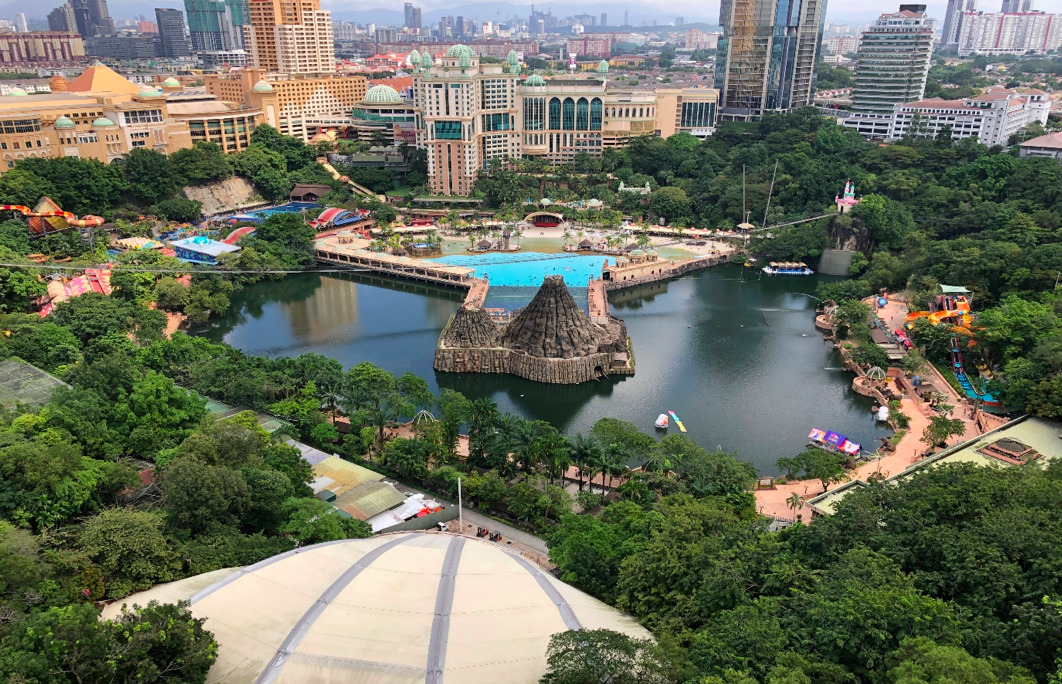
View of Sunway group, 2020. © Malaysia / Shutterstock
China's politics has historically focused on exploiting the influence of Overseas Chinese in Southeast Asia with ''Home'' in various forms, where the major trading companies reflect the history of China in many senses, such as the term 'Sun' which refers to the father of the Chinese nation, is the title of giant companies in Southeast Asia. The timing could be a factor in China’s policy, as the official strategic relations between China and Southeast Asian countries have initially relied on party diplomacy since the founding of the People's Republic of China in 1949.
To summarize: in the era of the term geopolitical and economic competition, interest in Beijing's diplomatic cards is back. Which called for exploring the possibilities of shifting from - being Chinese to being politically Chinese - and the mechanisms of turning Southeast Asia into the creation point of a ''China state'' where, the measures that would modernize the counter-strategy have become urgent, requiring political and diplomatic involvement accompanied by economic anthropology.
:
[1] CHARLIE CAMPBELL, ‘Taiwan's President Under Fire Over Historic Meeting With China’, TIME, Nov 5, 2015.
[2] Skinner, G. William, ‘Overseas Chinese in Southeast Asia’,The ANNALS of the American Academy of Political and Social Science, 2016.
[3] Wang, Shufang, Xiao Xue, Axing Zhu, and Yuejing Ge, ‘The key driving forces for geo-economic relationships between China and ASEAN countries’, Switzerland: Sustainability, 2017, blz.7.
[4] Ministry of Commerce of the PRC, National Bureau of Statistics of the PRC, State Administration of Exchange Control, 2016. Statistical Communique on China’s Foreign Direct Investment in 2015. Beijing: China Statistics Press. (in Chinese)
[5] Kamarul Azhar, ‘Demystifying FDI and loans from China’, theedgemarkets, Feb 09, 2018.
[6] Liang, Yutian, Zhengke Zhou, and Yi Liu, ‘Location choices of Chinese enterprises in Southeast Asia: The role of overseas Chinese networks’, Germany: Journal of Geographical Sciences, 2019, blz.7.
[7] Deng Xiaoping, Selected papers of Deng Xiaoping, Beijing People Press, 1993, p.366.
[9] Zhuang Guotu, Huaqiao huaren yu Zhongguo de Guanxi (Relations of ethnic Chinese and China),Guangdong: High Education Press, 2001, p.381.
[10] Qiaowu Gongzuo Yanjiu (Studies of Overseas Chinese Affairs), No.2, 2004, p.1.
[11] George T. Haley, Usha C. V. Haley, ChinHwee Tan, New Asian Emperors: The Business Strategies of the Overseas Chinese, Singapore: John Wiley & Sons, 2009.
[12] Samuel P. Huntington, The Clash of Civilizations and the Remaking of World Order, London: 1997, p.170.
[13] Skinner, G. William, ‘Overseas Chinese in Southeast Asia’, online: The ANNALS of the American Academy of Political and Social Science, 2016.
[14] Taiwan Review, ‘Communist In Southeast Asia’, TAIWAN TODAY, June 01, 1959.
[15] Robert C. O’Brien, ‘How to Teach Beijing a Lesson in Ukraine’, foreignpolicy, Sep 1, 2022.

قبل 3 أشهر
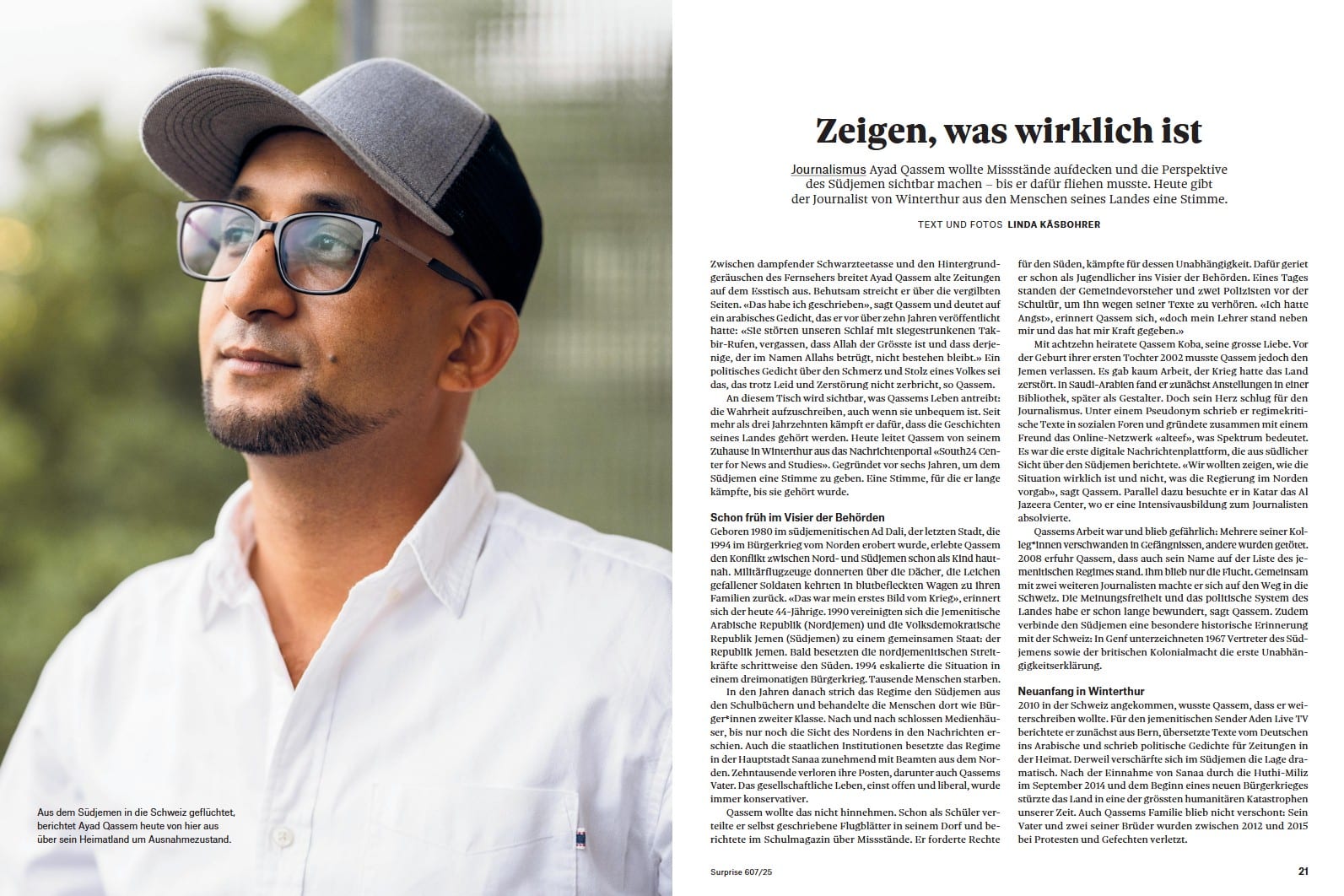
قبل 3 أشهر